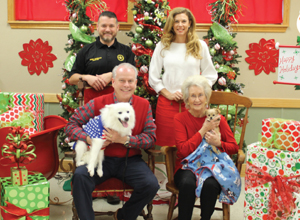
Fort Bend PAWS supporters Commissioner Vincent Morales, Pat Hebert, Rene Vasquez and Elaine Dietz at Santa PAWS.
Feature | By Dan Murphy –
Each year, more than 3,500 homeless pets are taken in by Fort Bend County Animal Services (FBCAS) in Rosenberg. That breaks down to almost ten cats, dogs, rabbits, birds or other surrendered animals every day. And, as a county facility, FBCAS is required by law to accept any animals taken into their facility.
The task of caring for that many animals – including providing food, shelter, medical care and grooming – while looking to pair up the pets with new “forever homes” is a daunting challenge. Fortunately, FBCAS has made great strides in meeting that challenge head-on. Moreover, with the creation of the new Fort Bend PAWS (Pets Are Worth Saving) organization, FBCAS is on its way to achieving “no-kill” status and expanding its services to the next level.
On the Path to “No-Kill”
 The road to “no-kill” actually began in January 2015 when FBCAS officially set a goal of achieving the “no-kill” designation. To be designated as a “no kill” facility, at least 90 percent of the animals admitted must be saved. Under “no kill” guidelines, euthanasia is reserved for terminally ill animals or animals that cannot be safely adopted out. At that time, following the local leash law ordinance, all feral cats had been euthanized upon intake to curb the local feral cat community.
The road to “no-kill” actually began in January 2015 when FBCAS officially set a goal of achieving the “no-kill” designation. To be designated as a “no kill” facility, at least 90 percent of the animals admitted must be saved. Under “no kill” guidelines, euthanasia is reserved for terminally ill animals or animals that cannot be safely adopted out. At that time, following the local leash law ordinance, all feral cats had been euthanized upon intake to curb the local feral cat community.
Enacting the policies and practices to attain the “no-kill” designation was a lofty goal and one that required adjustments facility-wide, as well as community outreach. Eventually, but unavoidably, the need included fundraising. “Over the last three years, many changes have been made to achieve our goal of a ‘no-kill’ designation,” said County Commissioner Vincent Morales, a supporter of the FBCAS and one of the founders of Fort Bend PAWS. “One of our initial efforts was to increase the social media presence of the shelter on Facebook and Twitter, which allows for the pets to be seen by a wider audience. That effort was successful as it also led to increasing the number of rescue partners who work with the shelter to save more dogs and cats.”
Through these initial efforts, FBCAS also recruited additional volunteers and fosters to help with the animals until adoptive families could be found. In 2017, the shelter hired a staff veterinarian and veterinary technician, which allowed for the facility to perform spay and neuter surgeries on site, as well as minor medical procedures, including rabies vaccinations, which had previously been outsourced to a contracted veterinary practice. “That was the real turning point for the medical care of the pets,” said Morales.
Two additional animal care technicians were later brought on to help care for the increasing number of animals kept in the kennels on site. And, the planned opening of a new intake facility in 2019 will further expand the sterilization surgical procedures for the veterinary staff, Morales said.
Implementing Trap Neuter Return
While FBCAS had been able to maintain the 90% threshold for surrendered dogs, the feral and community cat population provided a significant challenge, particularly in unincorporated Fort Bend County. In June, a new Trap Neuter Return (TNR) policy was rolled out on a pilot basis in Needville and Richmond. Under the TNR program, residents of those areas could bring cats to the shelter in a humane trap, and surrendered cats would be sterilized, given a rabies vaccination and have their left ear tipped as a marker to signify that they are in the release program. The cats are then returned to their home environment.
Since the introduction of the pilot program, FBCAS has posted save rates of 91% in August, 91% in September and 90% in October, bringing the facility in line with the “no-kill” standard.
FBCAS management also reached out to organizations including Best Friends Animal Society and Alley Cat Allies and developed a working relationship to review updated shelter evaluation policies and procedures for new innovative programs. That’s how Fort Bend PAWS got its start.
Fort Bend Pets Are Worth Saving
“During an assessment of FBCAS by Best Friends Animal Society, it was suggested that a nonprofit be formed to provide financial assistance in its effort to improve the save rate for the county’s homeless pets,” said Morales. “Working with Judge Bob Hebert and county staff, I was asked to take the lead on achieving the effort this year.”
Pat Hebert was quick to offer her assistance. “Vincent approached me and asked if I would like to get involved,” said Hebert. “I have rescued animals from FBCAS in the past. Animals speak to my heart. The county can’t do fundraising, so Fort Bend PAWS was a way to assist with fundraising and help with animal services. I thought if there was any way I could help that cause, I would do it.”
Hebert knows from experience that strays cats can become wonderful pets having brought a cat into her home years ago. “One cold day, he ran into the house, and I had myself a new pet,” she shared. “Maybe you can’t keep an animal forever, but you can still foster and get involved. Being a foster for even a short while makes an enormous difference.”
Fort Bend PAWS was incorporated in the fall of 2018 and established as a fundraising and awareness-building organization to assist the shelter. The PAWS board of directors is comprised of Morales as president, Hebert as treasurer and Elaine Dietz as secretary.
“Being involved with Fort Bend PAWS is important to me because it’s a way for me to serve the community that I love and has been home to my family for generations,” said Dietz. “Fort Bend PAWS has the ability to make a direct impact on serving Fort Bend Animal Services because the money we raise goes directly to providing a way to take care of those unforeseen needs in short term emergency situations, as well address long-standing issues of providing more in-depth medical treatment to get these animals out of the shelter and into people’s homes quicker.”
Fort Bend PAWS has created a Facebook page and is using social media to help draw more attention to the animals up for adoption. It is also working to raise funds to support the shelter’s efforts.
 Morales said Fort Bend PAWS and the “no-kill” effort has received strong support from the community. “It has been very well-received by the public. One gentleman, who wishes to remain anonymous, donated a 1978, 25th-year-anniversary edition red Corvette. He had visited FBCAS previously, and now, after having been diagnosed as terminally ill, he wanted to give this vehicle valued at $30,000 to an organization that could help FBCAS.”
Morales said Fort Bend PAWS and the “no-kill” effort has received strong support from the community. “It has been very well-received by the public. One gentleman, who wishes to remain anonymous, donated a 1978, 25th-year-anniversary edition red Corvette. He had visited FBCAS previously, and now, after having been diagnosed as terminally ill, he wanted to give this vehicle valued at $30,000 to an organization that could help FBCAS.”
Fort Bend PAWS is selling 300 raffle tickets for $100 each for a chance to win the Corvette. The drawing is scheduled for February 15th, 2019 at a reception at Safari Texas benefitting Fort Bend PAWS. Tickets are available by e-mailing fortbendpaws@gmail.com.
While the FBCAS is making significant strides towards its “no-kill” goal, there is still plenty of work to be done, Morales said. “They still need to expand their facilities to include an X-ray machine and other equipment. Looking ahead, FBCAS would like to become an adoption destination for the county and beyond, reinventing itself as a Pet Resource Center, creating an intake prevention program and expanding the volunteer, foster and transport programs. Another goal is to offer more educational opportunities to the public on responsible pet ownership and to implement a viable low-cost spay/neuter opportunity to the Fort Bend County community.”
“Not every animal can be adopted, I know,” said Hebert. “But if we can adopt out the animals we can and spay or neuter others and return them to their habitat, they can still live a good life. If we can keep this going, maybe we can save more animals and not need as many services as we do now.”
For more information or to contribute, find Fort Bend PAWS on Facebook or email Fort Bend County Animal Services at AnimalServices@fortbendcountytx.gov.
